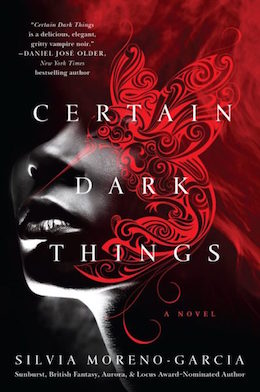Mexico City does not allow vampires within its borders—but that doesn’t necessarily keep them out. Atl, a vampire whose lineage traces back to the Aztecs, finds her way into the city while on the run from the rival gang of European vampires who executed her family. Domingo, a young man who makes his living sifting garbage for a rag-and-bone man, meets her and her genetically modified Doberman on a train. She’s desperate enough to make him an offer: payment for blood. She has no intention of drawing him in to her life, but they prove to be better matched than either initially suspected.
Certain Dark Things is Moreno-Garcia’s second novel, following the well-received Signal to Noise (2015). An urban fantasy set in a lovingly crafted Mexico City, the novel is a refreshing take on the tropes of the genre: the female protagonist is supported by a tender, fairly innocent, dedicated man, and the romantic tension is complicated significantly by their being from different species. Furthermore, it isn’t anglocentric in its approach to mythology and the supernatural.
Moreno-Garcia’s approach to her subject matter is original and therefore rather immediately engaging. Her vampires come from several subspecies and are born rather than created—some more recently in the evolutionary chain than others. The ethnic differences in these vampires and how different countries across the globe have handled their public existence allows Moreno-Garcia to infuse a subtle but thorough political awareness in the world of the novel. She is making a complex argument, in particular, about the culture and political situation of Mexico on the world stage—and about the influences of globalization versus colonization.
The attention to detail in things like the ethical ambiguities and failures present in the policing system as Ana Aguirre navigates it make this world feel vibrant and human. There aren’t simple answers: Atl isn’t a good or pleasant person, and as she explains to Domingo, she isn’t some girl running away from a branch family in the drug wars. She was second in line to inherit, and she absolutely participated in the business. Nick Godoy is a monster, of course—the old fashioned serial killer kind, not just a vampire—but Atl isn’t without her moral problems either.
Spoilers follow.
As a whole, though, this is a direct and uncomplicated read. Atl flees to Mexico City, meets Domingo, and the two of them go through a series of travails in their attempt to get her further south and out of the reach of the Godoy family; in the end, after a string of conflicts that end in the death of the young Godoy scion Nick and police officer Ana Aguirre, Atl escapes and Domingo remains behind. The structure is reminiscent of short fiction, as is the pacing, though in length it’s obviously a longer piece. The intrigue is sourced entirely from the reader’s concern for Atl’s escape plan, but the action takes place in a condensed time frame and there isn’t much uncertainty left otherwise.
It’s a fun and fast read, but it doesn’t give the reader much to work with in terms of tension. There’s a single arc, it follows a predictable and straightforward path, and the characters all sort out about where we would expect them to at the close. The reason to read the novel isn’t, then, the plot—which is serviceable but not remarkable or particularly engaging. Instead, it’s the characters. Domingo, in particular, is an excellent protagonist. He’s simple in his outlook in some respects; his life has been narrow, though hard, and he’s still a teenager. He’s good at survival and good at reading situations, which makes him a solid choice for Atl’s companion. She chooses him out of necessity, but comes to love him for who he is.
That relationship as it develops is very charming, and I appreciated that Moreno-Garcia nonetheless doesn’t attempt to have them run off together. He’s still so young, and Atl is, as she explains, bound to be the cause of his death if he remains with her. The difference in species is more than cultural—it’s also functional. It’s nice to see a vampire novel with romance that acknowledges and doesn’t attempt to apologize for or erase that fact. Domingo and Atl do fall for each other sharply and quickly, but it’s better for them to separate. It’s refreshing to see a romantic plotline end in a realistic manner, and it was definitely the thing that bumped this book up in my estimation.
Certain Dark Things isn’t the strongest novel, to be sure. There are a significant number of information blasts in the first portion on vampires that were unnecessary and broke up the pacing. The plot, also, isn’t compelling beyond its basic action. However, Moreno-Garcia’s voice and take on the urban fantasy genre are refreshingly original. The relationship is complex and represents a male protagonist in an emotional role I don’t often encounter in romantic narratives; also, and again, the use of politics and culture to round out the world makes it feel remarkably alive, present. All told it’s a passable book and a quick, pleasant read. Domingo and Mexico City itself are the most engaging bits, and those do make it worthwhile. Plus, I’m definitely glad to see more work in the genre that represents a diverse and fresh approach.
Certain Dark Things is available from St. Martin’s Press.
Lee Mandelo is a writer, critic, and editor whose primary fields of interest are speculative fiction and queer literature, especially when the two coincide. They have two books out, Beyond Binary: Genderqueer and Sexually Fluid Speculative Fiction and We Wuz Pushed: On Joanna Russ and Radical Truth-telling, and in the past have edited for publications like Strange Horizons Magazine. Other work has been featured in magazines such as Stone Telling, Clarkesworld, Apex, and Ideomancer.










